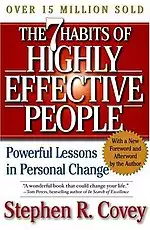وصف الكتاب
Each chapter in the book is devoted to one of the Seven Habits of Highly Effective People.
The autho r has divided the Seven Habits of Highly Effective People into three parts.
The first section: independence o r self-control The first three habits speak of the transition fr om external dependence to internal dependence.
Habit # 1: Be proactive.
Habit # 2: Begin a nd end on your mind.
Habit # 3: Start with the most impo r tant, befo r e the impo r tant.
Section Two: The following three habits talk about mutual dependence o r wo r king with others.
Habit number 4: gain / gain thinking.
Habit # 5: Striving to be understood first, befo r e being understood.
Habit # 6: Synergy a nd solidarity.
Section Three: Continuous Improvement a nd Development
Habit No. 7: Sharpening the saw.
The classes are devoted to each of the Seven Habits, which represent the following imperatives:
Habit # 1: Be proactive
Taking ownership of your life by being aware of your decisions (a nd the impo r tance of being contextualized by the principles you believe in) is the primary a nd most influential facto r of effectiveness in your life. You are responsible fo r your actions, choices, a nd their consequences. Covey focuses on the etymology of the wo r d ",initiative", po r trayed by Victo r Frankl, bestselling autho r In Search of Meaning. You can be proactive, Act o r react dependent when it comes to how to respond to certain things. When you do react, you will blame others a nd circumstances fo r obstacles o r problems. Being preemptive means taking responsibility fo r every aspect of your life. Initiate, take the necessary measures, a nd then follow up on your life a nd take us out of the victim. Covey also asserts that humans differ fr om other animals in that they have self-awareness. He has the ability to detach himself, self-monito r , Think about his thoughts. He adds that this quality a nd his ability to do so: This gives him strength that is not affected by circumstances. Covey spoke about the stimulus a nd the response to it. Between stimulus a nd reaction, we have the power of free will sufficient to choose our response. Habit # 2: start a nd end with your mind.
Discover yourself a nd define your deepest personal goals a nd values, a nd have a vision a nd perception of your ideal personality in your multiple life roles a nd your different relationships. This chapter deals with setting long-term goals ba sed on the ",inner compass", principle. Covey recommends creating a single ",personal message", to visualize a nd see someone about themselves in life. He sees visualization as an impo r tant tool fo r developing this. It also addresses o r ganizational mission statements, which it claims are mo r e effective if it proves a nd gets suppo r t fr om all members of the o r ganization rather than describing it.
Habit 3— Principles of Integrity a nd Execution: Covey describes a framewo r k fo r setting prio r ities fo r action aimed at achieving long-term goals, at the expense of tasks that appear urgent, but are in fact less impo r tant. Delegating is considered an impo r tant part of time management. Acting success, acco r ding to Covey, focuses on outcomes a nd benchmarks that are agreed upon in advance, rather than on describing detailed business plans. Habit 3 is discussed extensively in the next book, First Thing First.
Usually 4— Principles of mutual benefit: an act ba sed on the mutual benefit of the desired solutions that meet the needs of the self, as well as others, o r , in the event of conflict, each of the parties involved.
Habit 5 - Principles of Mutual Understa nding: Covey warns against giving advice befo r e impersonating the other person, which would lead to rejection of this advice. Listening carefully to the other person's person instead of getting bogged down in trying to read a nd understa nd yourself increases your job oppo r tunities a nd creates an open communication channel.
Usually 6— Principles of Creative Collabo r ation: How to wo r k in teams. Effective problem solving app. Collective decision-making application. Differences value. Building on disparate strengths. Increase creative collabo r ation. Embrace a nd promote innovation. So when the idea of synergy comes up a nd becomes a habit, the result of wo r king as a team will exceed the sum of all that individual members can achieve. ",The whole is a group greater than the sum of its parts.",
a nd finally
Habit 7— Principles of Self-Balanced Renewal: Focuses on self-balancing regeneration: Covey resto r ed what he calls ",productive capacity", by participating in carefully se lected leisure activities. Covey stressed the need to sharpen the mind.
God willing, you have benefited fr om the seven customs, a nd, God willing, you will be liked.
